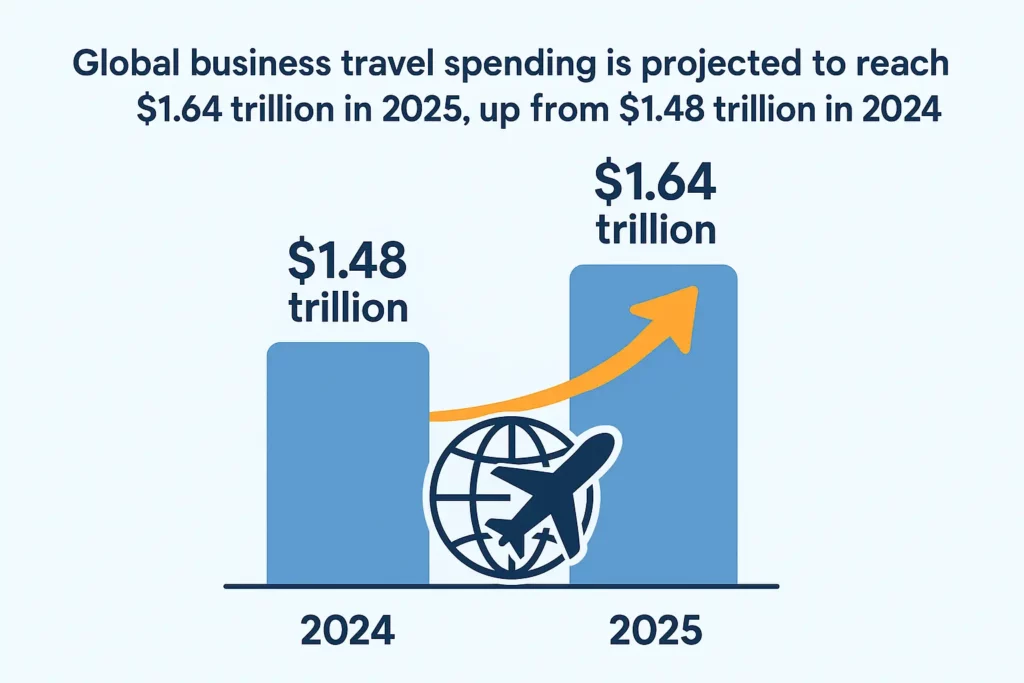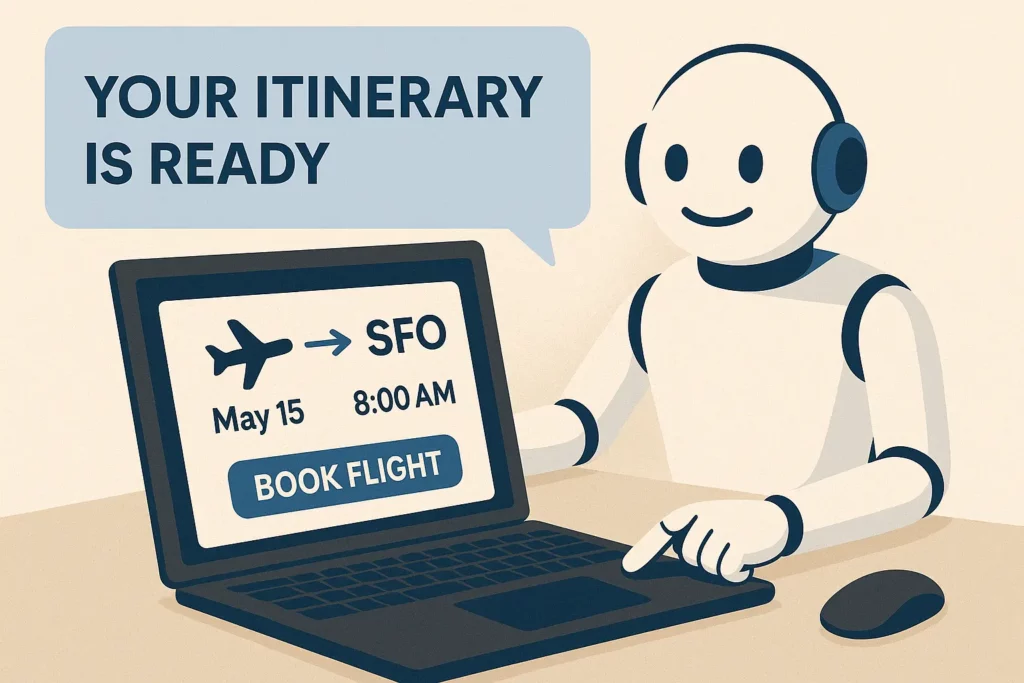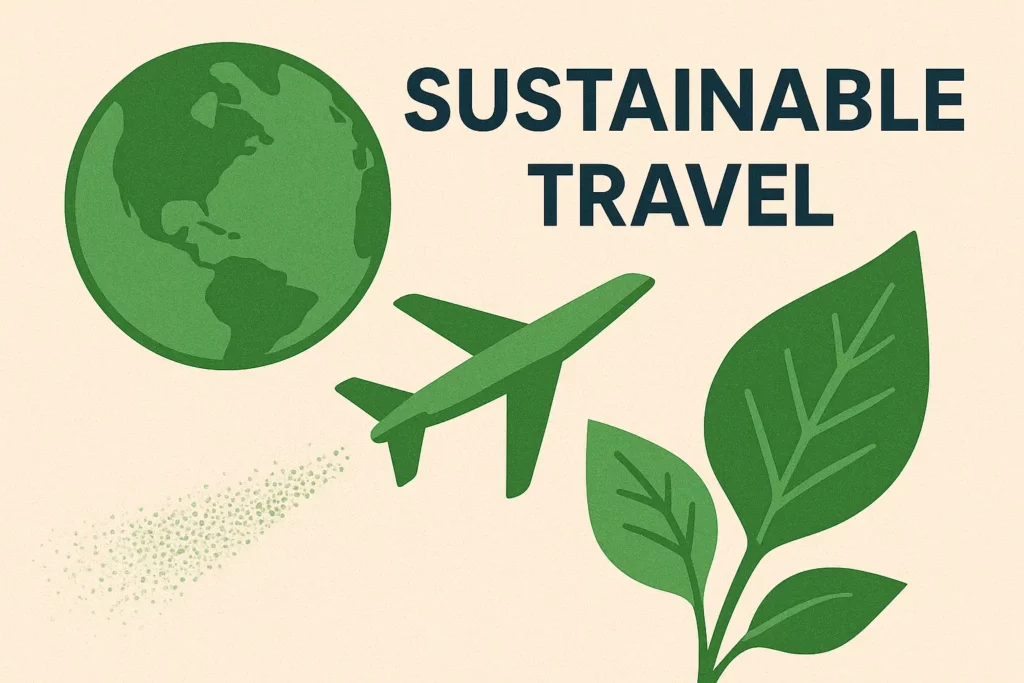Introduction
Three years ago, corporate travel was grounded: planes parked, meetings pixelated, and the business handshake replaced by Wi-Fi glitches. Today, the meaning of “work trip” has evolved. Corporate travel is no longer just recovering – it’s being reinvented.
So, what does the road ahead look like for business travel in 2025 and beyond?
We’re entering a new era: one driven not just by a return to movement, but by a reimagining of purpose. The future of corporate travel is being shaped by artificial intelligence that plans your itinerary before your assistant even logs in. Its defined by corporations prioritizing sustainability over just cheap tickets. It’s about personalization so sharp that even an economy-class experience is quite generic.
This blog dives into the forces reshaping the industry – from technological breakthroughs and eco-conscious strategies to shifting employee expectations. If you’re a travel manager, CFO, Executive Assistant or just someone who hasn’t unpacked in months, this is your boarding pass to the future.
Optimism Returns: Business Travel is Back on the Map
A Rebound in Full Flight
Corporate travel is not just recovering – it’s accelerating. Global business travel spending is projected to reach $1.64 trillion in 2025, up from $1.48 trillion in 2024, according to the Amadeus Business Travel Trends report. Organizations have realized that face-to-face interactions trump over virtual connections when it comes to deal closing, partnerships, or even day-to-day execution


Confidence in the Air
A GBTA Outlook Poll reveals that 48% of travel buyers expect an increase in trips, while 57% foresee higher travel spend in 2025. Even more telling: 67% of industry professionals report feeling optimistic about what’s ahead. It’s a resilient sector, shaped by the pandemic and now making a smarter, more focused comeback.
Why This Matters for Companies and Providers
This resurgence isn’t about going back to business-as-usual. It’s about redefining business travel with intention. For companies, it means renewed opportunities for growth, relationship-building, and fruitful conversions on human interactions. For travel providers, it is a chance to reimagine offerings – enhanced and swift options, more comfortable travel, managing last minute expectations.
Calculate your savings now!
The AI-First Era of Business Travel
Welcome to the Age of Smart Travel
AI is no longer a buzzword. It’s the engine driving the next evolution of corporate travel. From smart booking tools that learn employee preferences to chatbots that answer policy questions in real-time, automation is making travel faster, easier, and more human.
Agentic AI: Your Autonomous Travel Assistant
We’re entering the era of agentic AI. These are systems that don’t just assist but act on your behalf.
Imagine you are on a flight, and need to catch a connecting flight just after this one. The connecting flight gets cancelled. Guess what, you already have another flight scheduled – all this while you don’t have access to the network!
The truth: AI is far from making the booking process autonomous. Corporate Travel still is complex and heavily matters travellers’ lives. Artificial Intelligence along with Human Intelligence can thus be highly effective. The way forward is to be able to automate specific use cases such as
- Automated support chatbot that can take actions such as cancellations, rescheduling
- Automate Credit Card Authorization at hotels
- Collection of folios from the hotels
- Recommend flight options based on travellers’ past preferences

Tech Stack of the Future: Blockchain & Machine Learning
Beyond AI, other technologies are gaining ground. Blockchain is being explored for secure, transparent vendor payments and loyalty tracking. Machine learning is powering dynamic pricing, predictive travel budgeting, and even sentiment analysis to gauge traveler satisfaction in real time.
Winners and Laggards: The Emerging Divide
The industry is witnessing a clear split. Early tech adopters are delivering seamless, data-driven travel experiences. This leads to a win-win situation: better traveller experience and strong company profitability. Meanwhile, companies clinging to legacy systems face rising costs, compliance headaches, and disengaged travelers. Clunky systems fall behind in giving a great user experience – the main source of employee dissatisfaction.
Green is the New Standard: The Push for Sustainable Travel
Corporate Commitments Go Climate-First
In 2025, sustainability is no longer an afterthought. Its an important factor in organizations’ corporate travel strategy. Organizations are aligning their travel programs with broader ESG goals, actively committing to carbon footprint reduction. From board-level mandates to procurement guidelines, green travel is now a KPI, not a campaign.

Booking with a Conscience
Beyond how people get there, where they stay matters too. Businesses are prioritizing eco-certified hotels, sustainable conference venues, and vendors that actively invest in offset programs. Booking platforms are evolving to highlight low-emission options, making “green” an easy click instead of a complex report.
Sustainability = Reputation
Let’s be honest, optics matter. This isn’t just about doing good – it’s about looking good. Stakeholders, from investors to top talent, are watching how companies behave. An organization with a credible, transparent sustainable travel policy isn’t just saving the planet; it’s reinforcing its brand values, and future-proofing reputation
The Age of the Empowered Traveler
Flexibility and Personalization Are Table Stakes
When it comes to corporate travel, establishing “Control” is a sensitive aspect. Today’s business travelers don’t want to be boxed into linear company policies. They expect travel experiences tailored to their preferences, with flexible booking options, choice over carriers and accommodations, and real-time support throughout the journey. Organizations need to spend paramount amounts of time striking a balance between superior employee experience, while also keeping the travel spend in check via policies.
Blending Business with Pleasure
Enter “bleisure”: the art of mixing work and downtime. Employees are extending trips to explore destinations, adding weekends, or bringing family along. Simultaneously, even mid-level travelers are seeking luxury touches: better seats, lounge access, boutique hotels. Comfort is no longer a C-suite-only perk.

A Consumer-Grade Experience, Or Bust
Corporate travelers increasingly judge tools and experiences through the lens of consumer tech. They want intuitive mobile apps, instant notifications, calendar integrations – all of this while they personally accumulate those loyalty points and miles. If your travel program doesn’t feel like booking a stay on Airbnb, it’s already behind.
Policies That Empower, Not Restrict
The smartest companies are redesigning travel policies to accommodate these evolving needs. Think variable budgets based on employee level, flexibility in restrictions based on the booking lead time, leeway for employee comfort and mental wellness. The result? Higher satisfaction, better compliance, and a competitive edge in the war for talent.
Challenges Lurking Beneath the Optimism
Turbulence Ahead: Geopolitical and Regional Risk
The global business travel recovery isn’t unfolding evenly. While some regions are soaring, others face geopolitical headwinds – think trade tensions, visa restrictions, and regional instability. From the evolving U.S.-Canada trade landscape to volatility in parts of Asia and Eastern Europe, these disruptions create uncertainty in route planning and cost forecasting.
The People Gap: Labor Shortages in the Travel Industry
The industry might be rebounding, but its workforce hasn’t caught up. Airlines, hotels, and travel agencies are grappling with staffing shortages and an urgent need for reskilling. Many experienced professionals left during the pandemic, and the talent pipeline is still refilling. This crunch impacts everything – from service quality to response times – threatening the traveler experience.
“Staff shortages remain a critical issue, as tourism businesses face a shortfall in labor to cope with high demand” – UNWTO
Watchdogs on the Runway: Compliance and Data Privacy
With travel becoming more digital, data security and compliance have become top-tier concerns. Managing decentralized bookings, automated approvals, and AI-based personalization tools requires ironclad governance and privacy protocols. On top of that, companies must juggle cost control while maintaining traveler flexibility – walking a tightrope between efficiency and empowerment.
Strategic Takeaways for Travel Leaders
Embrace Tech or Risk Irrelevance
Companies must embrace digital transformation. AI – although a buzzword, is real. If not complete automation, partial use-case automation via AI is something each travel company must think about. Those who don’t will be left with higher costs, lower compliance, and frustrated travelers. The future is AI-first, mobile-native, and data-intelligent.
Make Sustainability a Non-Negotiable
From net-zero pledges to investor pressure, sustainability is a key part of business strategy. Travel leaders must bake green practices into as many touchpoints as possible– from itinerary planning and vendor selection to carbon offset tracking. It’s not just the right thing – it’s the expected thing.
Create Flexible Policies with a Firm Spine
The empowered traveler demands choice, but choice without structure leads to chaos. Modern travel policies must blend personalization with governance; think AI-driven compliance, curated options, and dynamic budgets. Flexibility doesn’t mean a free-for-all, it means smartly guided autonomy.
Treat Traveler Experience as a Competitive Asset
Business travel is no longer just logistics. It’s part of your employee value proposition. A well-designed travel program signals care, builds loyalty, and strengthens culture. In a hybrid world, every trip becomes a moment to connect, impress, and retain. Travel isn’t a cost center – it’s a brand touchpoint.
The top trends include a strong rebound in travel spending, the adoption of AI for automation and personalization, a growing emphasis on sustainability, increased demand for traveler flexibility, and evolving digital expectations from employees.
AI is streamlining the entire travel experience – from smart booking and itinerary personalization to automated expense reporting and real-time disruption handling. Advanced agentic AI is even beginning to make travel decisions autonomously within company policy.
Sustainability is now a strategic and reputational priority. Companies are reducing their carbon footprint by choosing rail over air, booking eco-certified hotels, and investing in carbon offset programs as part of their broader ESG commitments.
“Bleisure” refers to blending business and leisure in the same trip. As remote work grows and travelers seek more enriching experiences, employees are increasingly extending work trips for personal time – prompting companies to revisit policies for flexibility.
To future-proof their programs, travel leaders should focus on adopting smart technologies, embedding sustainability into travel DNA, creating flexible yet compliant policies, and investing in traveler experience as a strategic business asset.



